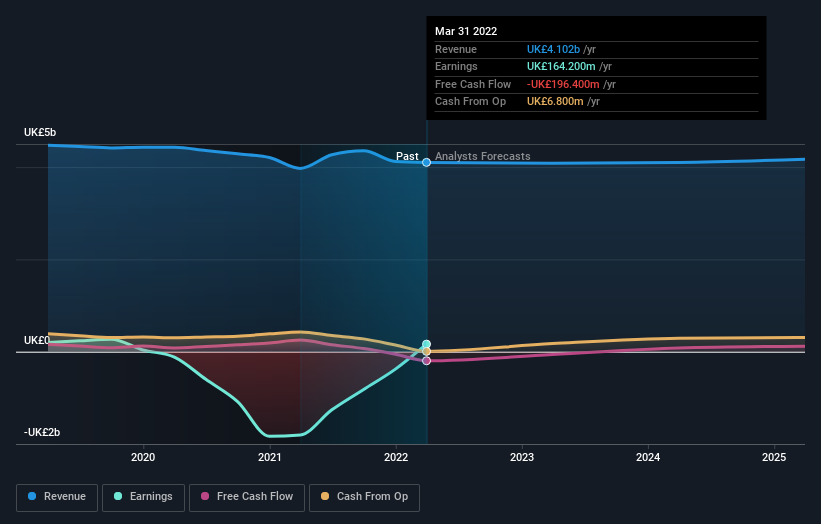- United Kingdom
- /
- Aerospace & Defense
- /
- LSE:BAB
Is Now The Time To Look At Buying Babcock International Group PLC (LON:BAB)?

Babcock International Group PLC (LON:BAB), is not the largest company out there, but it saw significant share price movement during recent months on the LSE, rising to highs of UK£3.61 and falling to the lows of UK£3.01. Some share price movements can give investors a better opportunity to enter into the stock, and potentially buy at a lower price. A question to answer is whether Babcock International Group's current trading price of UK£3.06 reflective of the actual value of the small-cap? Or is it currently undervalued, providing us with the opportunity to buy? Let’s take a look at Babcock International Group’s outlook and value based on the most recent financial data to see if there are any catalysts for a price change.
See our latest analysis for Babcock International Group
What Is Babcock International Group Worth?
Good news, investors! Babcock International Group is still a bargain right now according to my price multiple model, which compares the company's price-to-earnings ratio to the industry average. I’ve used the price-to-earnings ratio in this instance because there’s not enough visibility to forecast its cash flows. The stock’s ratio of 9.41x is currently well-below the industry average of 21.67x, meaning that it is trading at a cheaper price relative to its peers. However, given that Babcock International Group’s share is fairly volatile (i.e. its price movements are magnified relative to the rest of the market) this could mean the price can sink lower, giving us another chance to buy in the future. This is based on its high beta, which is a good indicator for share price volatility.
What does the future of Babcock International Group look like?

Investors looking for growth in their portfolio may want to consider the prospects of a company before buying its shares. Although value investors would argue that it’s the intrinsic value relative to the price that matter the most, a more compelling investment thesis would be high growth potential at a cheap price. However, with a relatively muted revenue growth of 1.7% expected over the next couple of years, growth doesn’t seem like a key driver for a buy decision for Babcock International Group, at least in the short term.
What This Means For You
Are you a shareholder? Even though growth is relatively muted, since BAB is currently trading below the industry PE ratio, it may be a great time to increase your holdings in the stock. However, there are also other factors such as capital structure to consider, which could explain the current price multiple.
Are you a potential investor? If you’ve been keeping an eye on BAB for a while, now might be the time to enter the stock. Its future outlook isn’t fully reflected in the current share price yet, which means it’s not too late to buy BAB. But before you make any investment decisions, consider other factors such as the strength of its balance sheet, in order to make a well-informed investment decision.
If you want to dive deeper into Babcock International Group, you'd also look into what risks it is currently facing. Every company has risks, and we've spotted 2 warning signs for Babcock International Group you should know about.
If you are no longer interested in Babcock International Group, you can use our free platform to see our list of over 50 other stocks with a high growth potential.
Valuation is complex, but we're here to simplify it.
Discover if Babcock International Group might be undervalued or overvalued with our detailed analysis, featuring fair value estimates, potential risks, dividends, insider trades, and its financial condition.
Access Free AnalysisHave feedback on this article? Concerned about the content? Get in touch with us directly. Alternatively, email editorial-team (at) simplywallst.com.
This article by Simply Wall St is general in nature. We provide commentary based on historical data and analyst forecasts only using an unbiased methodology and our articles are not intended to be financial advice. It does not constitute a recommendation to buy or sell any stock, and does not take account of your objectives, or your financial situation. We aim to bring you long-term focused analysis driven by fundamental data. Note that our analysis may not factor in the latest price-sensitive company announcements or qualitative material. Simply Wall St has no position in any stocks mentioned.
About LSE:BAB
Babcock International Group
Engages in the design, development, manufacture, and integration of specialist systems for aerospace, defense, and security in the United Kingdom, rest of Europe, Africa, North America, Australasia, and internationally.
Very undervalued with solid track record.
Similar Companies
Market Insights
Community Narratives


